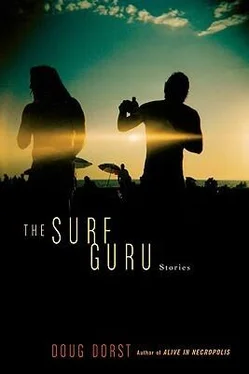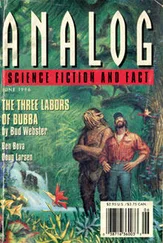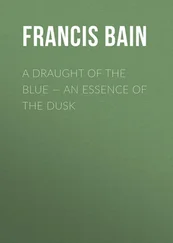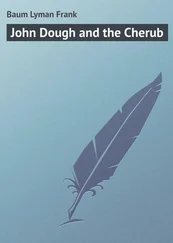“It’s mine,” the kid says.
“I don’t like you thinking about my girl like that.”
“Like how?”
Alvaro drives his knee into the kid’s groin. “Don’t play innocent,” he says. “You’re among men.”
The kid writhes in the sand and finds himself looking into Sergio’s wide and dead and fly-spotted eyes. The pain, the sight, the stench, all unbearable.
“I could just take her from you, if I wanted,” Alvaro says over him, “but I’m a sportsman, so I’ll win her back. I’ll flip a coin. If I win, you give her to me.”
The kid rolls away from the head and retches, once, twice, a third time. “If I win,” he manages, “you tell me her name. And where she lives.”
“Happily,” Alvaro says. “So. Will it be heads or castles?” The kid staggers to his feet and steps away from Sergio. “Castles.” He’s had enough of heads for one night.

The coin is in the air, spinning.
Even if the beach were bathed in moonlight, the kid would not have noticed that Alvaro had two coins in his hand, flipping one while tucking the other against the fleshy mound near his thumb.
Even if there were moonlight, the kid would not notice that the coin is now spinning from head to head, creating a blurred and fluttering but uninterrupted image of the Queen.
Even if there were moonlight, the kid would not notice Alvaro producing the second coin to show him a head and a castle, to prove that the game was fair.
And because there is no moonlight, the kid will not be able to steal one last glimpse of the photograph before handing it over.
“I hope you’ve kept the picture clean,” Alvaro says. “You’ll owe me if you’ve soiled her.”
Already the kid’s image of her is coming apart. He can recall a length of thigh, eyelashes, nipples, a glistening forehead, a mouth calling to him in a language composed solely of O sounds, but he cannot put them all together to make a woman. “I’ll win her back someday,” he says.
Alvaro laughs. “Enough. I’m tired, and you and Sergio have a long night ahead.”
The kid sniffles. “But the flies,” he says. “The smell.”
Tears roll down his face, and Alvaro has to stifle his urge to catch one on his finger so he can taste the shame. Instead, he drapes his arm around the kid’s narrow shoulders. “You want some advice? The head won’t smell so bad if you rinse it in the ocean.”
“I don’t want to touch it.”
“I will carry it for you. A courtesy between men. Come with me.”
Together they walk toward the ocean, the kid kicking sullenly through the dark sand, Alvaro buoyantly swinging the head by its long, stringy hair. At the water’s edge, before the kid can grasp what is happening, Alvaro winds up and hurls the head mightily over the waves. The kid hears a faraway splash. He scans the ocean, hoping to spot the head floating in the flickering, luminous water. Hoping even to see ripples. But the head is gone, swept away by the riptide.
Gone. The head is gone. His life is over.
“Adios, kid. It would be best if you started running now.” Alvaro smiles. Victories are rarely so complete.
The kid turns slowly in circles, as if considering a direction to run, as if the high, humid forest were not his only option. A sound comes from his throat, and it reminds Alvaro of a baby chinchilla crying for milk. Then, after a few stutter-steps in the sand, the kid sprints up the beach, taking a wide arc around the sleeping army.
Once the kid has disappeared into the trees, Alvaro strolls back to his tarp and settles down to sleep with the photograph buttoned safely inside his shirt pocket. Tomorrow he can go back to selling glimpses of his girl to the men for cupfuls of foot powder, and he can get some relief for his goddamned ruined feet.

In his tent, the general awakens to the soft light of dawn. He buckles on his nose and goes out to greet the men. The morning sky is pink and gray. A barnacled black crab scuttles past his feet. Wood smoke tickles his sinuses as he watches his men rise and drift zombielike toward the fire, lining up for coffee with tin cups dangling from crooked fingers. The general takes a stick of salt-cured meat from his pack, bites into it, and chews contentedly, feeling kingly. That Alvaro , he thinks with admiration, he is a bad bishop in an extreme sense. And these men are my strong pawn center. And Sergio, a captured knight, is off this board for good.
But where is the kid? Where is the head? Where, goddamnit?
His eyes whirl out of focus. He bites his lip until he tastes blood. Is there no one he can trust? Has everyone been witched by the Queen? How many heads will he have to take? Where will he keep them? His armies will be slowed, so loaded down with heads will they be! There will be a great volley of heads over the castle walls! He will need many more catapults!
He shouts Alvaro’s name, demanding answers. A wet shred of meat falls from his mouth into the sand. He bends to retrieve it, puts it back in his mouth just as Alvaro arrives.
“I am appalled,” Alvaro says. “I thought the kid was one of us.”
Bits of sand grind the general’s teeth, but he continues to chew, loudly, adamantly. “Find him,” he says.
Alvaro salutes crisply. “You will have his head by noon.”
The general returns the salute and watches Alvaro walk among the men, choosing his tracking party. He notes with satisfaction that over the years, his teniente ’s clothes have gone from a clean olive color to a deep rusty brown. This is the kind of man a general wants in his army, a man who has been flecked, spattered, daubed, smeared, and soaked with the blood of thousands. This is a man who can be believed in.
Summoning calm as only a seasoned commander can, the general gathers the rest of his men around him. He draws the day’s troop movements in the sand with a stick, pointing out each of the moves the Queen’s army might make in response and sketching countermeasures for each. Afterward, he kicks the sand clean, leaving no trace of his strategy.
Alvaro leads three other men through the forest, all of them wiry and mustachioed, eyes red-rimmed and gleaming. His pounding feet feel strong and new; he is only dimly aware of the burst blisters oozing in his boots. He stops and scans the forest around him. The kid is good, better than he expected — he has left no trail, no footprints in the wet black soil, no broken twigs, no trampled paths. Alvaro must follow his own animal instincts, and he leads the posse through barriers of fallen oaks, snarls of hyena weed, and buzzing clumps of hungry insects. He plunges through a dense thicket of saint’s-whip, and the razor-edged leaves and thorny branches slap his face, raising welts and thin, stinging cuts. He races on. This is the part he likes best.

The kid comes to the edge of the trees, many miles north of the rebel camp. He hears voices, and stops, crouches, tries to breathe softly, though his lungs are howling for air. Through the branches he can see a beach. The yellow sand is bright and unfamiliar. Playing in the waves are four young women in frilly pink suits. The water level is at their chests; when waves come, up to their necks. They laugh and splash and toss an inflated ball.
He assumes these girls have been taught to fear the rebels. He knows he must look feral and dangerous, his skin torn, his clothes heavy with black jungle muck, and he knows he must be giving off the myriad stinks of war. But still: what if he shed his cover and approached them? Even if there are men hidden nearby, guarding them — fathers and brothers and uncles, perhaps, armed with guns and knives and scythes and mauls and mattocks — how much worse could his chances be with them? To stay in the jungle alone is to be tracked relentlessly by Alvaro, a man who doesn’t just know the odds but sets them, a man who shakes fate in his fist as if it were a pair of weighted dice. Play long enough, and you will lose.
Читать дальше















